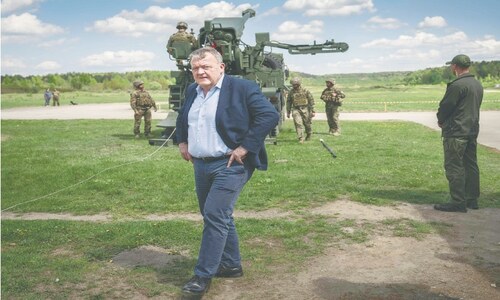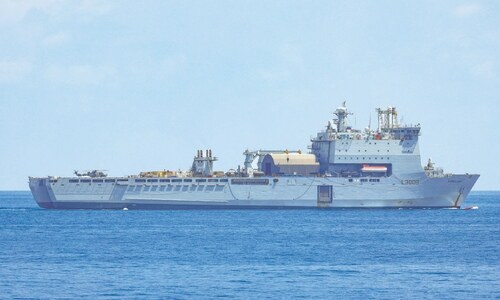ON Monday, Qatar's prime minister declared his state's intent to start helping the Syrian opposition “by all means”, including giving them weapons. Two days later, anti-Assad officials received an offer of a $100m donation, from their brothers in arms in Libya. Coincidence? Unlikely, if the Libyan revolution is any indicator.
The third act, in what looks very much like the beginning of a concerted push to arm the Syrian insurgency, took place on Thursday when the previously gun-shy Syrian National Council formed a military council, which it says will act as a clearing house for anyone offering it arms.
Two probabilities have quickly emerged: the first is that a militarised Syrian National Council is unlikely to be short of suppliers. And, second, Libya is merely a conduit for the $100m, which was at least partly funded by Qatar to get things rolling.
Libya's national transitional council has been quick to stress that the money it is sending is for humanitarian aid, which is clearly desperately needed in western Syria, withering under a regime offensive. No one in the nascent Tripoli government is quibbling about where the cash comes from. When asked how a state still in turmoil could afford such a generous gift, an spokesman for the Libyan council replied simply: “It won't be a problem”.
Qatar's remarks this week, as well as Saudi Arabia's claim last Friday that arming the Syrian rebels would be an “excellent idea”, clearly shows a new reality. The Rubicon has been crossed. Hopes of resolving Syria's raging insurgency through patience, or dialogue, have evaporated.
From the early days of the uprising against Colonel Qadhafi, Qatar was running more weapons to Libya's rebels than any other state. Throughout the war, giant Qatari military transporters regularly disgorged tonnes of weaponry in plain view at Djerba airport in Tunisia, not far from the Libyan border.
The Qataris sent jet fighters to bomb Qadhafi's armour and special forces to train rebels. They opened a military operations room in Doha and hosted the regime's highest-profile defectors, as well as rebel leaders to whom they provided with money and mentoring.
As Syria has unravelled throughout the past year, Qatar has played another lead role. It was centre stage in the Arab League's move to suspend Damascus as a member state and it has been increasingly strident in its criticism of President Bashar al-Assad, whom Qatar's ruling emir, Sheikh Hamad bin Khalifa al-Thani, had earlier tried to engage. As was the case in Libya, its agenda remains unclear.
The change in attitude had been subtle at first: a gradual disengagement, followed by increasingly stern back-channel diplomacy. All carried out in the way of the Arab world: avoiding insult or direct confrontation.
Not any more. “We should do whatever necessary to help them, including giving them weapons to defend themselves,” said Qatar's prime minister, Sheikh Hamad bin Jassim Al-Thani, on Monday. “This uprising in Syria now (has lasted) one year. For 10 months, it was peaceful: nobody was carrying weapons, nobody was doing anything. And Bashar continued killing them.
“So I think they're right to defend themselves by weapons, and I think we should help these people by all means.”
After urging political recourse and discouraging intervention for so long, the Syrian National Council is now also speaking from a markedly different script
“We wanted to organise those who are carrying arms today,” its president, Burhan Ghalioun, said, stressing that any weapons coming into the country should be vetted by the council.
“The revolution started peacefully and kept up its peaceful nature for months, but the reality today is different. We know that some countries have expressed a desire to arm the revolutionaries. The SNC will be this link between those who want to help and the revolutionaries. It is out of the question that arms go into Syria in confusion.”
It is also beyond doubt that a long predicted milestone in the Syrian conflict has now been reached. From this point, nation states, rather than black-market arms bazaars, loom as potential suppliers to the outgunned opposition. Such a prospect is alarming the US and Nato, which said this week it absolutely ruled out direct intervention in a war that nobody seems to want and most seem to fear.
By arrangement with the Guardian
















































Dear visitor, the comments section is undergoing an overhaul and will return soon.